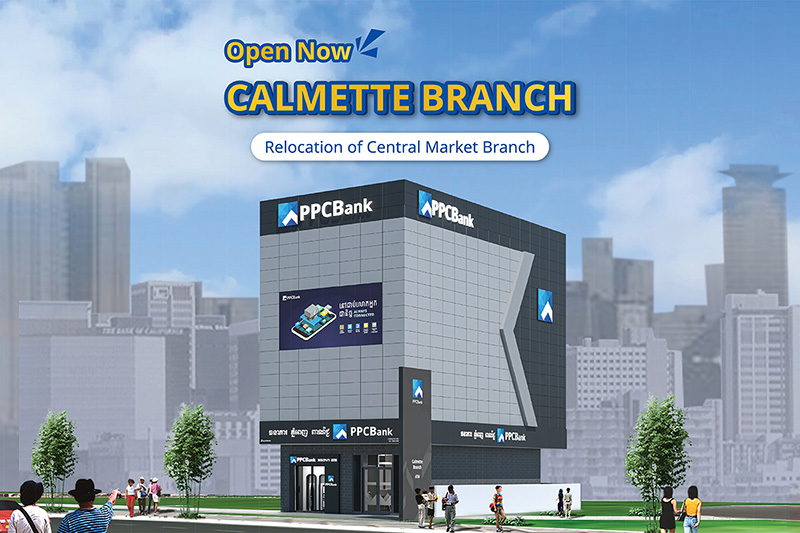PPCBank is hailing another successful quarter in 2020, despite the havoc the Covid-19 pandemic continues to cause. While Cambodia can be commended for managing to limit its Covid case count to below 400 and has reported zero deaths, 2020 has presented unprecedented challenges to businesses across the kingdom, the region and the globe. Despite this, PPCBank is grateful of the corporate developments it has seen and the growth it has enjoyed over the first three quarters of 2020. As a result, the bank is approaching 2021 with confidence.
The year has seen PPCBank increase its presence across the kingdom. Its branch network has been expanded, with the addition of two new branches in the capital. The first to open was on Preah Sihanouk Boulevard, with the second on Chroy Changvar. These take the number of PPCBank branches across Cambodia to 23. The number of ATMs has also grown significantly this year to 65, meaning increased convenience for clients, bringing PPCBank ever closer to them.
One more new SME Center have also opened this year in line with PPCBank’s commitment to make it easier for small and medium-sized enterprises to access banking services. One SME Center was opened in the Heng Ly Market Branch in 2019, with the other in the new Chroy Changvar Branch. These two centers, both strategically located, have contributed to a 6.82% increase in PPCBank’s SME clients as at the end of Q3. Business owners appear to be enjoying the bank’s approach, with dedicated staff offering in-depth consultation services, designed to tailor loan products with some of the most favorable conditions on the market. Information and assistance are also given in diversifying payment methods through contactless card terminals. Not only are these helping SMEs collect payments safely from their customers, but are also reducing their operational costs, which has been a major focus for the vast majority of business owners this year.
The biggest step PPCBank took in 2020, though, was its successful listing on the Cambodian Stock Exchange. The plan had been to list in one phase, but, like so many other plans this year, Covid changed that, with PPCBank listing in two phases. While this split was a Cambodian-first, the practice is quite normal in South Korea, which is home to PPCBank’s owners, the JB Financial Group and Apro Financial Co.
The listing’s 2nd phase was oversubscribed, demonstrating local confidence in the bank’s performance. Across the two phases, in April and October, a total of 800,000 bonds were snapped up with a total value of 80-billion Khmer Riel, representing a par value of 100,000 Khmer Riel per bond. The bonds have a maturity period of three years, with an attractive interest rate of 6.5% per annum. Funds raised are directed towards the continuous support the bank provides to SMEs, with them having been so hard hit by the Covid pandemic.
The stock market listing and the bank’s ongoing investment in SMEs have paid dividends for PPCBank this year. As a listed company PPCBank fully complies with reporting regulations. SCX will be disclosing performance results for 2020 on all the listed entities after review.
In a year where PPCBank had planned to get even closer to its customers, the pandemic meant it needed to learn how to maintain a safe, “social distance”. The bank quickly understood how important it was becoming for customers to have options when it came to managing their finances, without needing to visit branches in person. As a result bill payments, such as utilities, were introduced on the Mobile App, as was the facility to transfer money to local banks, as well as to international banks via SWIFT. Contactless VISA cards fast became another preferred way of avoiding handling cash. PPCBank ran a promotion waiving card exchange fees for those who wanted the contactless payment method. Clients in Phnom Penh can still get free delivery of their new contactless VISA cards.
In a further response to the pandemic, to assist its clients in accessing reliable information through as many remote channels as possible, PPCBank set up a 24/7 customer service center available via several phone numbers, as well as a live chat through Facebook, the bank’s website, the Mobile App and its corporate banking solution, smartBiz. With the pandemic still with us, PPCBank understands that people are still choosing to interact remotely, hence the launch of its new website, which is available in Khmer and English.
The pandemic has made travelling quite hard. With a good number of its clients being from Korea, Japan and China PPCBank understands how important it is for those clients to have up to date information on hand. That’s how “Japan Desk” section of the website was launched, enabling Japanese clients to access information online. Information in Korean & Chinese is also on the way to make the decision process as safe and convenient as possible for all of the bank’s clients even if they are forced to be away from Cambodia for now.
It has certainly been a busy, but productive year at PPCBank. We wish everyone a happy New Year and we can only hope that 2021 is much kinder to us all. With vaccines slowly being approved and rolled-out around the world, we can all start to see some light at the end of the very long tunnel that 2020 has been.
Whatever 2021 brings though, there is one thing that everyone can trust: that PPCBank will always be there for its customers, listening and working hard to provide safe, seamless and convenient banking.
